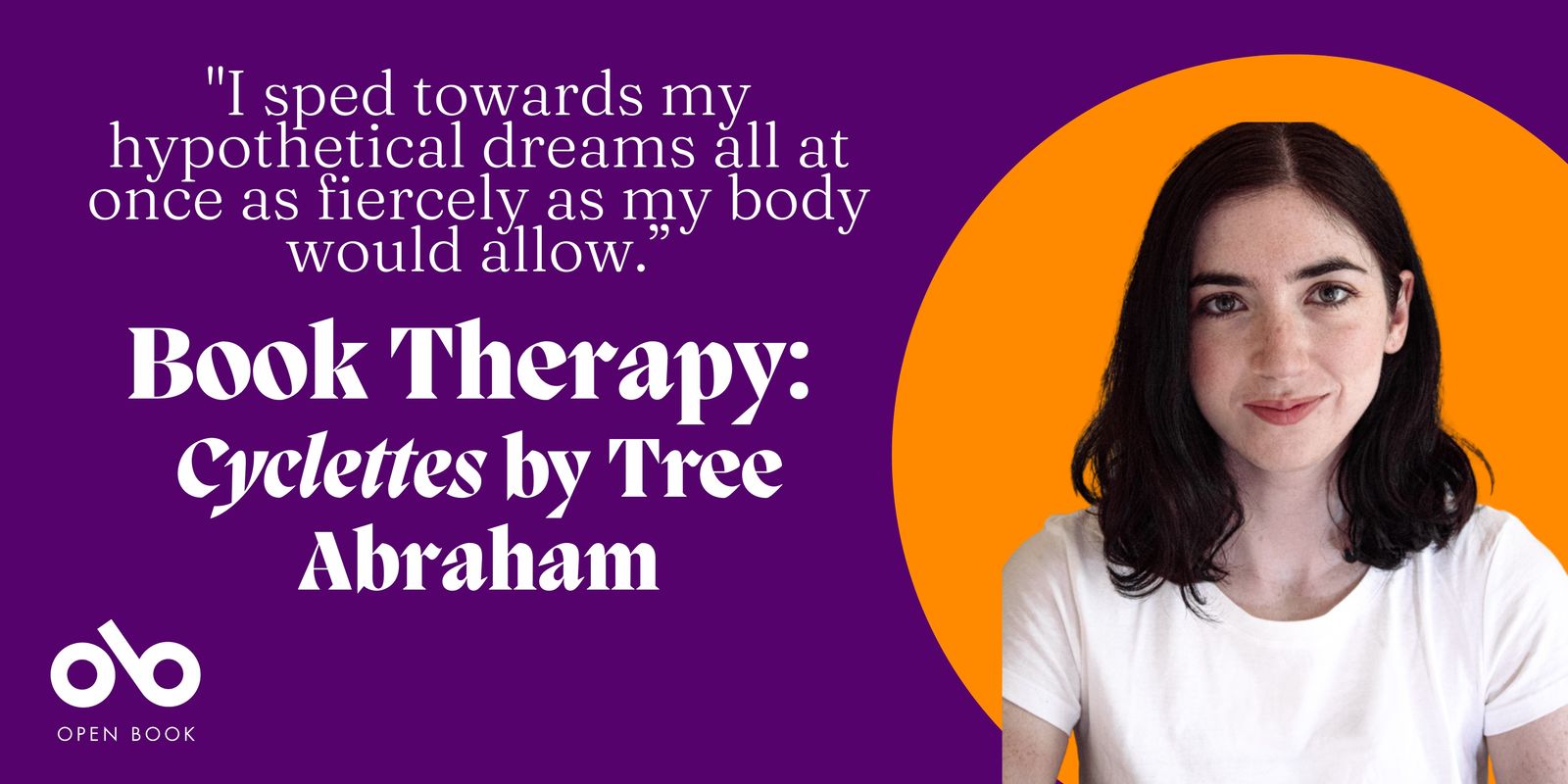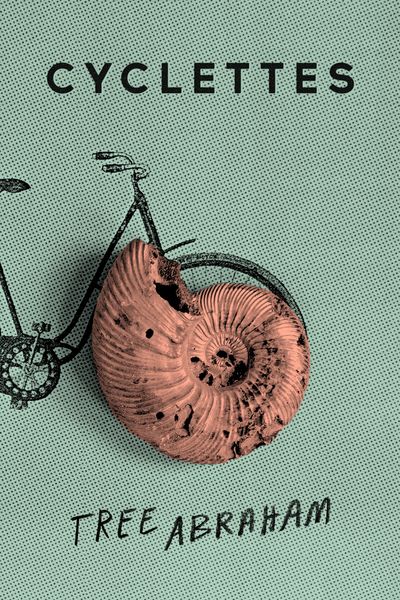Book Therapy: Cyclettes
By Stacey May Fowles
“If I had paused for too long to reflect on whether I was making the ‘right’ choices to optimize satisfaction, I might have become paralyzed in a never doing.
Instead I sped towards my hypothetical dreams all at once as fiercely as my body would allow.”
—Tree Abraham
Many years ago, before I became a mom, I went to a baby shower in Toronto’s east end. One of my partner’s close friends, an intimidatingly smart professor of feminist film with a wicked sense of humour, was having her first baby and had been kind enough to extend an invitation to a relaxed champagne-soaked function in her mother-in-law’s back yard.
I confess that I didn’t really know anything about babies then—didn’t even know if I ever wanted one of my own. I certainly didn’t have any insight into the unique challenges that came with new motherhood, had no idea what the experience did to your sense of self, your freedom, your mobility, or even your ability to shower with any regularity. On a picnic blanket in the back garden, another friend—this one a wise parenting veteran with two children of her own—elaborated on the dramatic transformation with an anecdote that has stayed with me ever since.
“I remember, a few months into my first son’s life, I rode my bike to a concert,” she told us. “It was a gorgeous summer night and I was going down this big hill, wind in my hair, and there was just this unbelievable sense of freedom that I just hadn’t felt in so long, you know?”
She smiled, then continued.
“For that moment I was finally myself again. It was so amazing to be alone, to be going somewhere that I picked myself and not have somebody clinging to me.”
At the time I of course couldn’t relate, couldn’t understand why a seemingly insignificant bike ride could mean that much to her. Maybe I was even a little confused by the fact that she wasn’t pushing a stereotypical narrative about how children are “such a gift.” In my ignorance I just smiled and nodded politely, but years later, when I had my own tiny baby and was feeling hemmed in by the demands of caring for that adorable but helpless human, her story came back to me.
In those early months I understood, deep in my bones, that desperate need for even temporary autonomy—the wind in my hair, a break from a responsibility so immense that it felt, at times, suffocating. That need for some wide open space and meandering self-direction. That simple yet euphoric experience of a bike ride on your own on a warm summer night.
I found myself revisiting that gleeful image of my concert-bound friend while I was reading Tree Abraham’s innovative non-fiction debut, Cyclettes. Part memoir, part historical and philosophical rumination, part gorgeous visual artifact, the book deftly conveys the elusive power of the humble bicycle, and in doing so reveals to the reader so much more.
Abraham, a designer, illustrator, writer, and “maker of things,” effortlessly bounces from personal experience to broader human truths and then back again. The author explores some of the fundamental questions of life—the competing pull of adventure and the warmth of home, the need for both independence and connection, the enduring conflict between freedom and security. The book belongs to a rare category that closely examines the mundane (the bikes that Abraham has had the pleasure to ride throughout her life, for example) to illuminate the vastness of life’s experiences (“Between the curvature of the mound and the uninterrupted seascape, I felt Earth’s rotundity.”)
Your CanLit News
Subscribe to Open Book’s newsletter to get local book events, literary content, writing tips, and more in your inbox
Scattered throughout we find photos, drawings, charts, maps and diagrams of all sorts—a visual representation of Buddhism’s Noble Eightfold Path, a video still of Abraham on a bike as a child, depictions of geometry’s golden ratio, a childhood diary plastered with stickers, pencil drawings of Cate Blanchett and Susan Sontag, a scrawled list of dream bike rides “to-do.”
In amongst all these charming artifacts, thoughtful reflections, and personal stories, Abraham reveals a fundamental tension that further illuminates the power of my friend’s summer night ride to a live show—that deep full-body love for her newborn son and how it bumped up against her very human need for adventure. The marked difference between running away from something or running towards something. The alluring wanderlust that just won’t leave, even when we crave the comfort, love, and devotion of a reliable home base.
“I have stood solitary in front of many roving waters,” Abraham writes of her travels. “The love in those days moved me to these days. I have collected my people, summer here, summer over there in other cities, countries, continents, but they are all spokes of love revolving around my wheel called home.”
***
My daughter is older now. For a time she rode on the back of my beat up silver bike strapped into her own turquoise seat, squealing with joy as we sped up or turned corners on small city side streets. But now that seat has been removed and she’s starting to ride her own pink sparkly bike on the neighbourhood sidewalks near our house, the training wheels on the back knowing their days are numbered. I watch as she finds her balance, finds her own autonomy.
“I‘m doing it!” she yells as she moves—necessarily—further away from me, a strange mixture of pride and heartbreak filling me up.
My days are more my own now, but when I ride by myself I try not to take that newfound ownership for granted. Motherhood is certainly not as all consuming as it was early in my daughter’s life, but it can still stifle, can strip away parts of you while you try to balance the urgency of your overwhelming love with the urgency of your own desires. The bike ride becomes a perfect metaphor in this way—giving the cyclist that much needed agency, while always bringing them back home.
“The bicycle is said to be a symbol of freedom,” Abraham writes. “But I don’t think this book is about freedom. Maybe a little: the freedom to individuate, to free myself from mediocrity in an unhealthy family, to be master of my fate, to go at my desired speed. But I am free. Yet there remains a deep yearning in me.”
Book Therapy is a monthly column about how books have the capacity to help, heal, and change our lives for the better.
The views expressed by Open Book columnists are those held by the authors and do not necessarily reflect the views of Open Book.
Stacey May Fowles is an award-winning journalist, novelist, and essayist whose bylines include The Globe and Mail, The National Post, BuzzFeed, Elle, Toronto Life, The Walrus, Vice, Hazlitt, Quill and Quire, and others. She is the author of the bestselling non-fiction collection Baseball Life Advice (McClelland and Stewart), and the co-editor of the recent anthology Whatever Gets You Through (Greystone).





